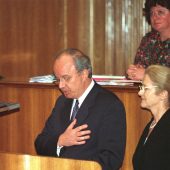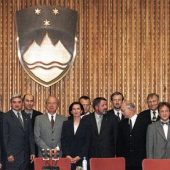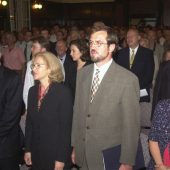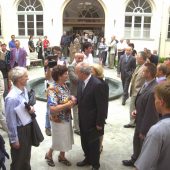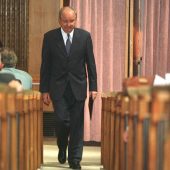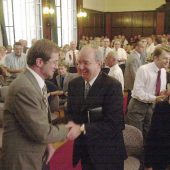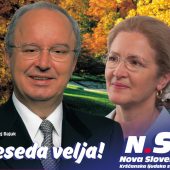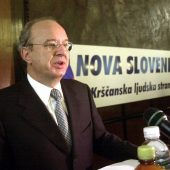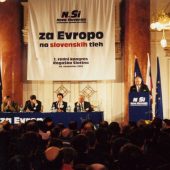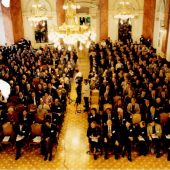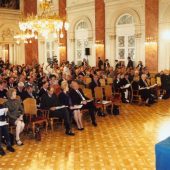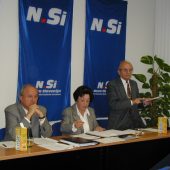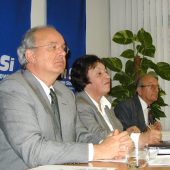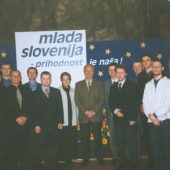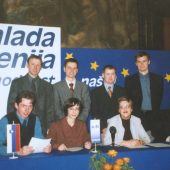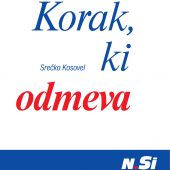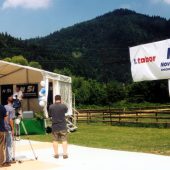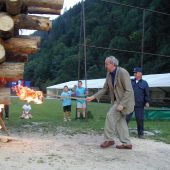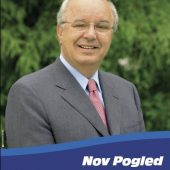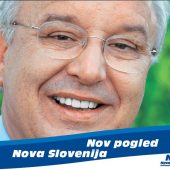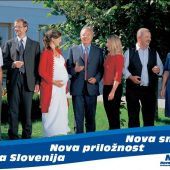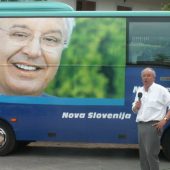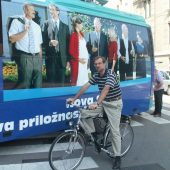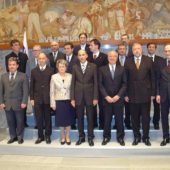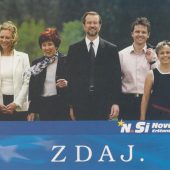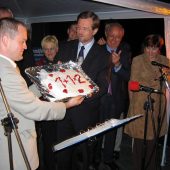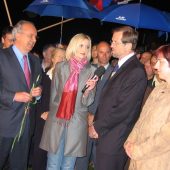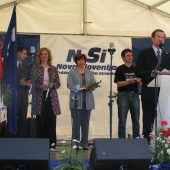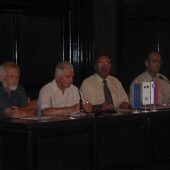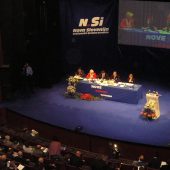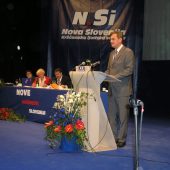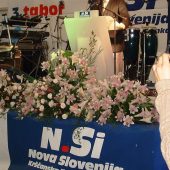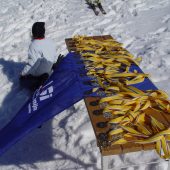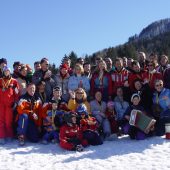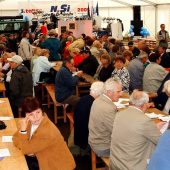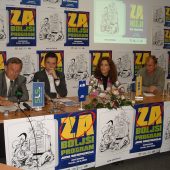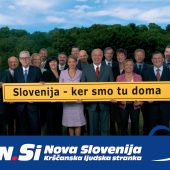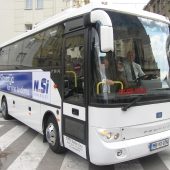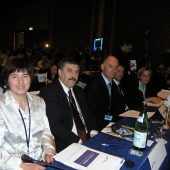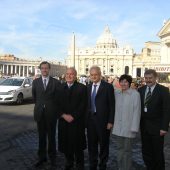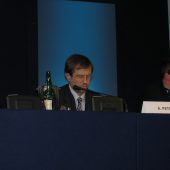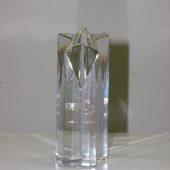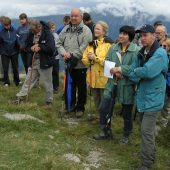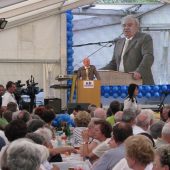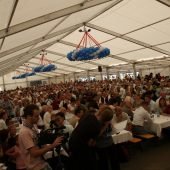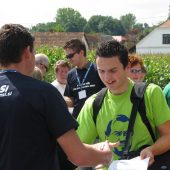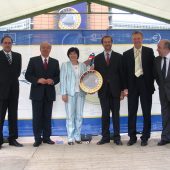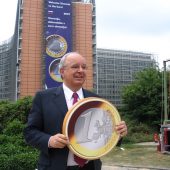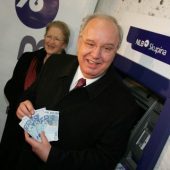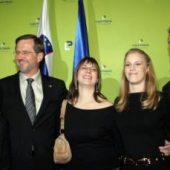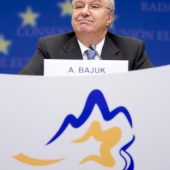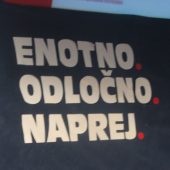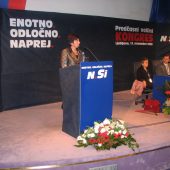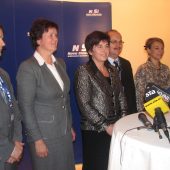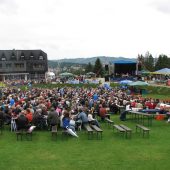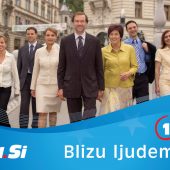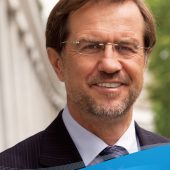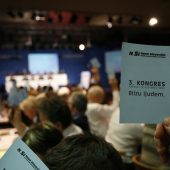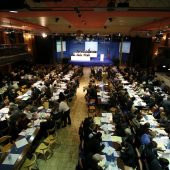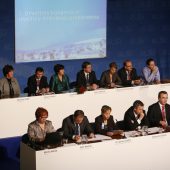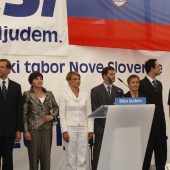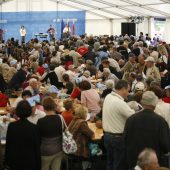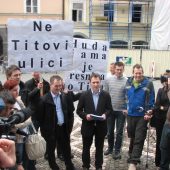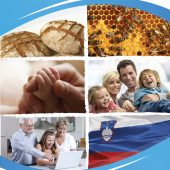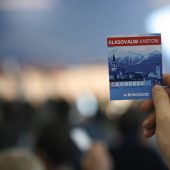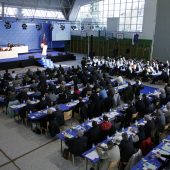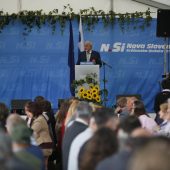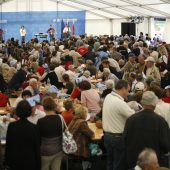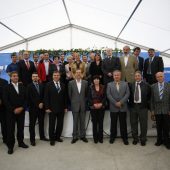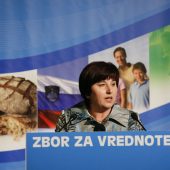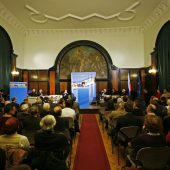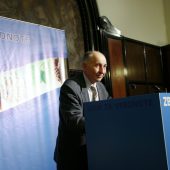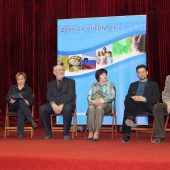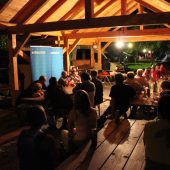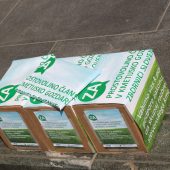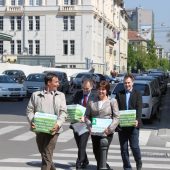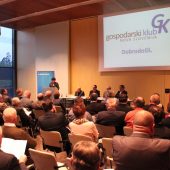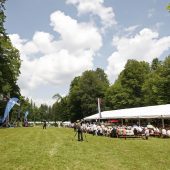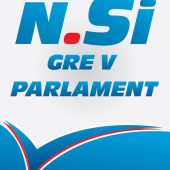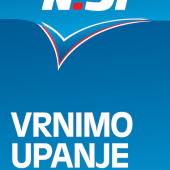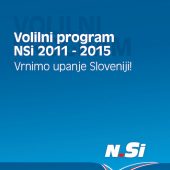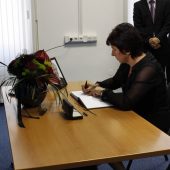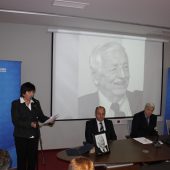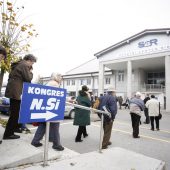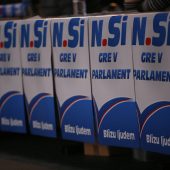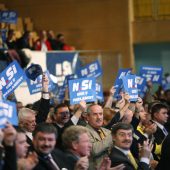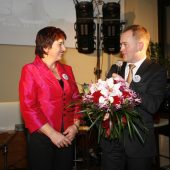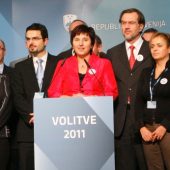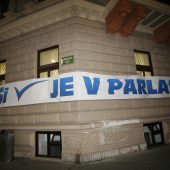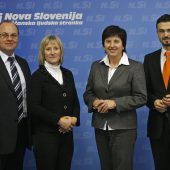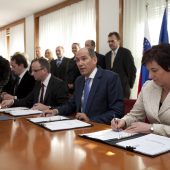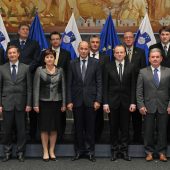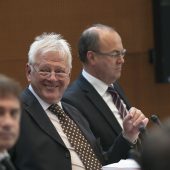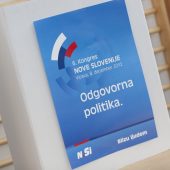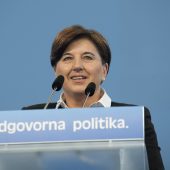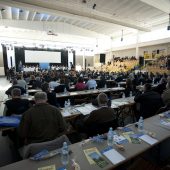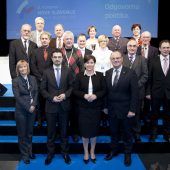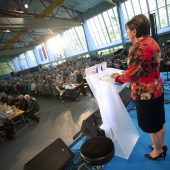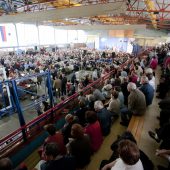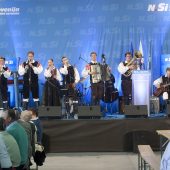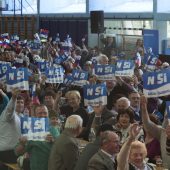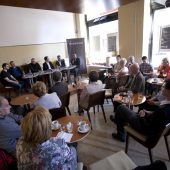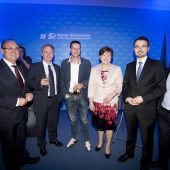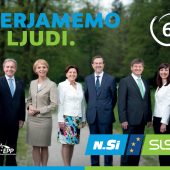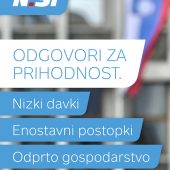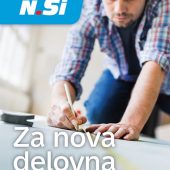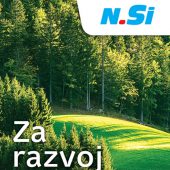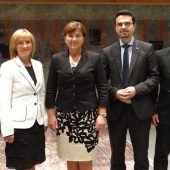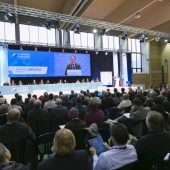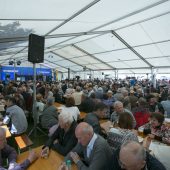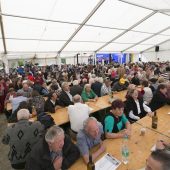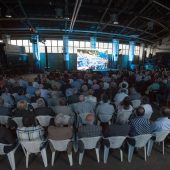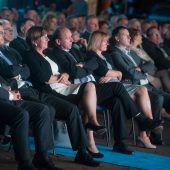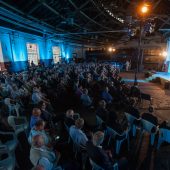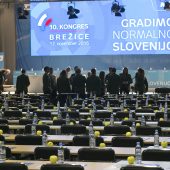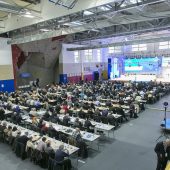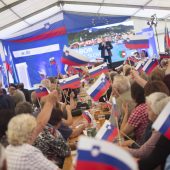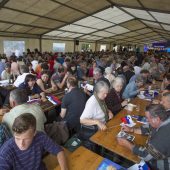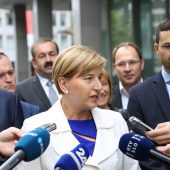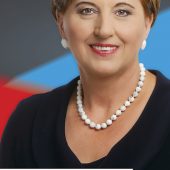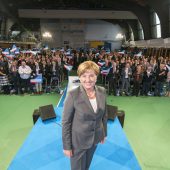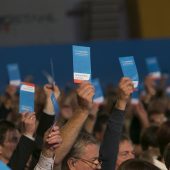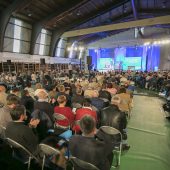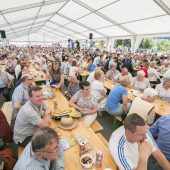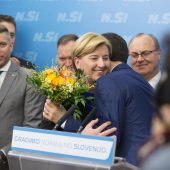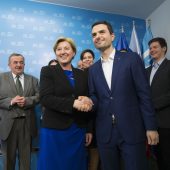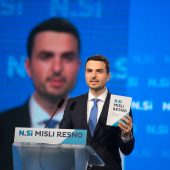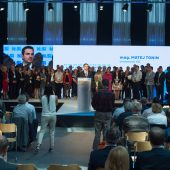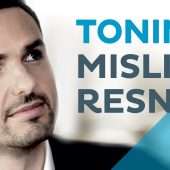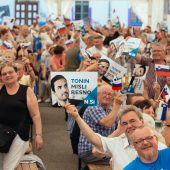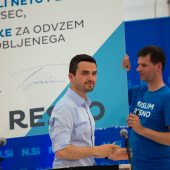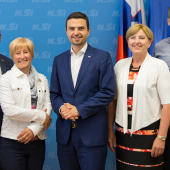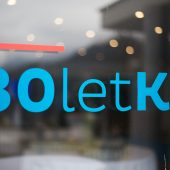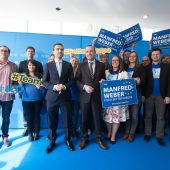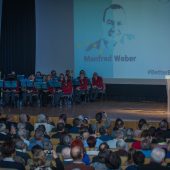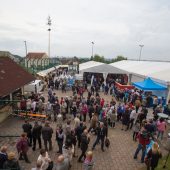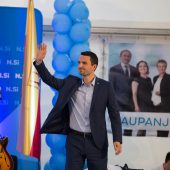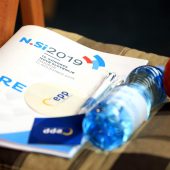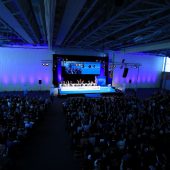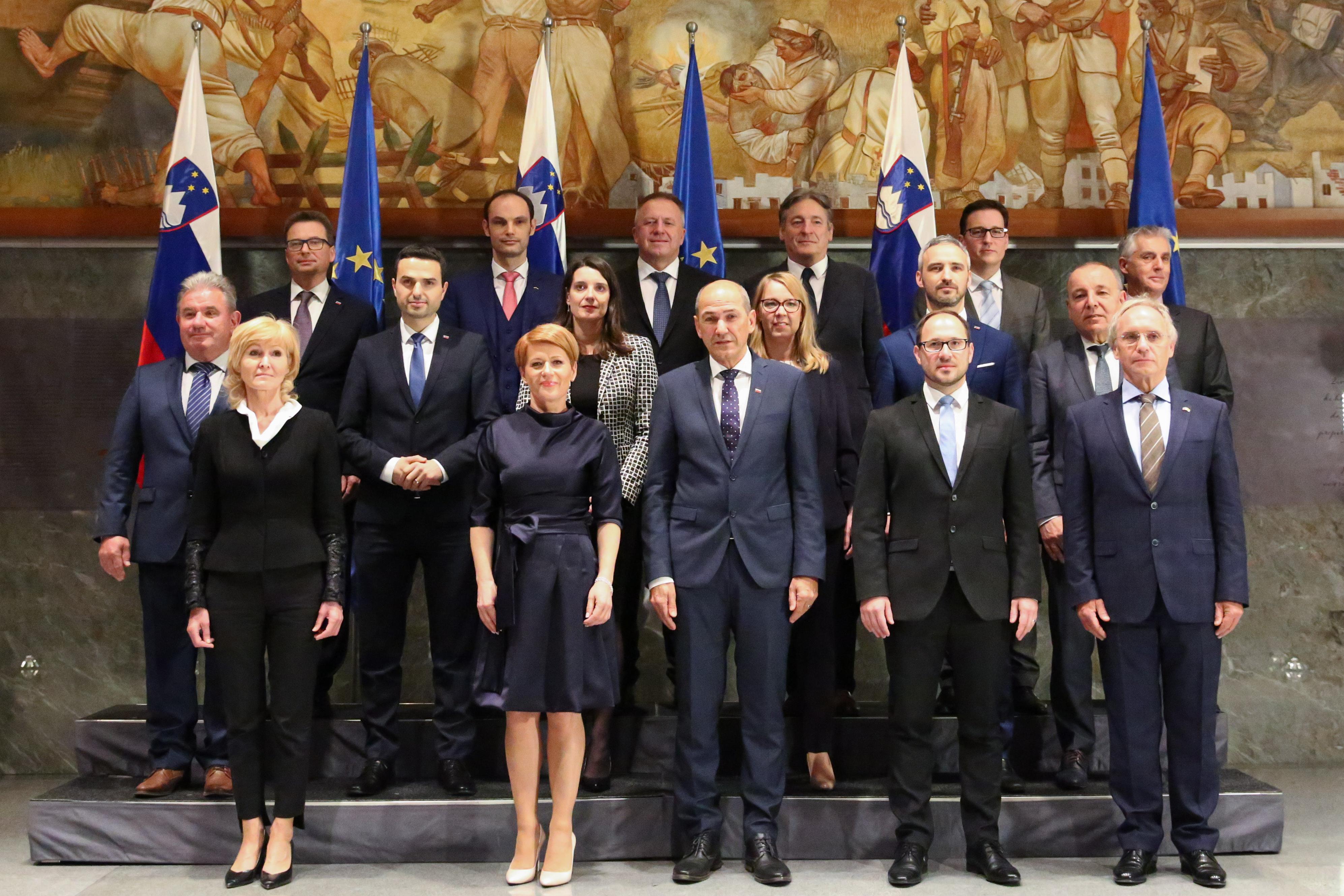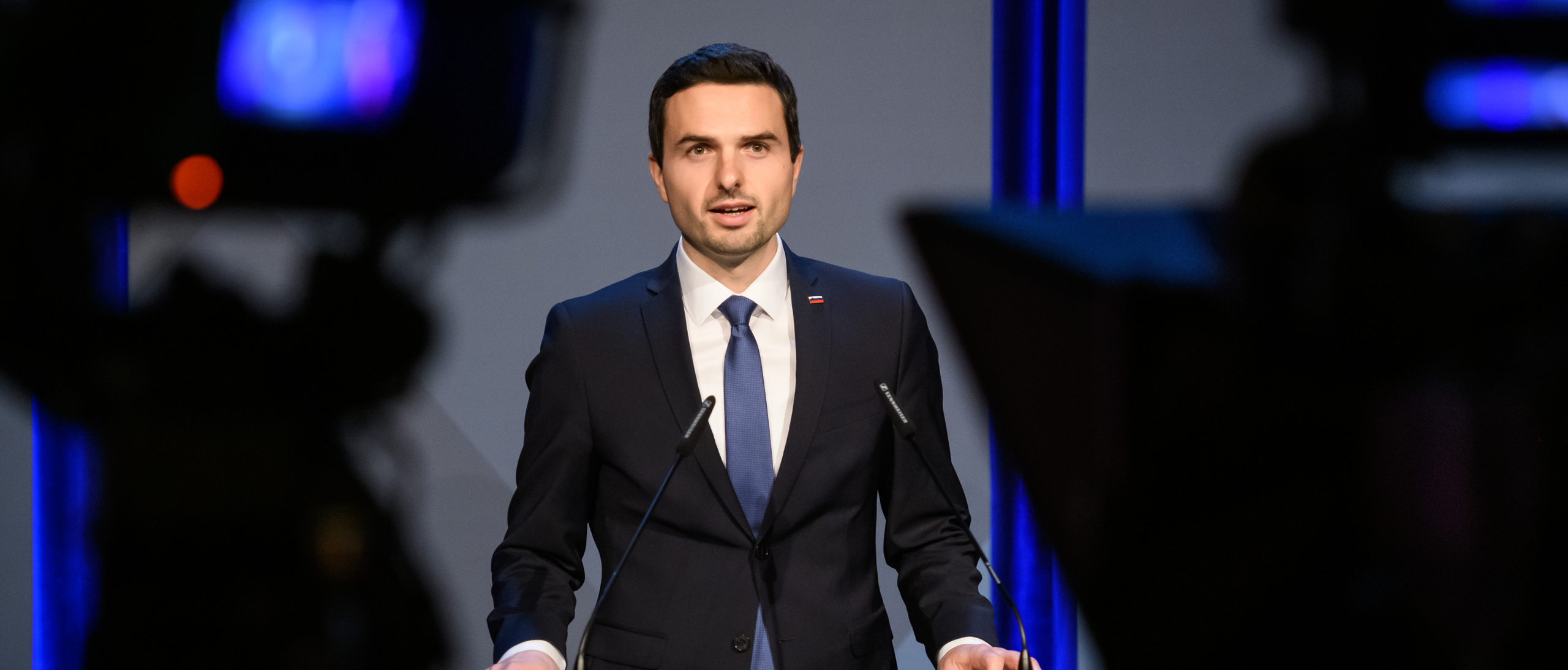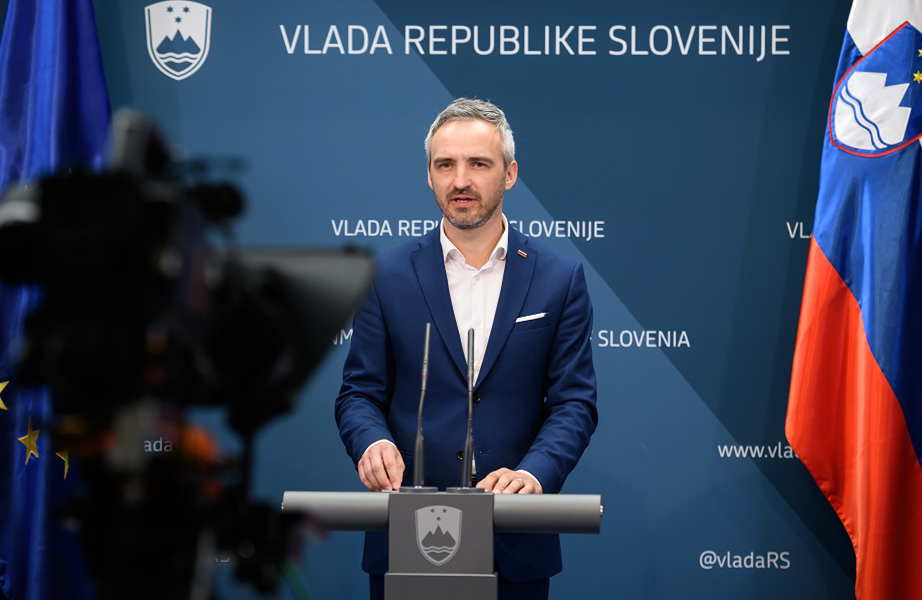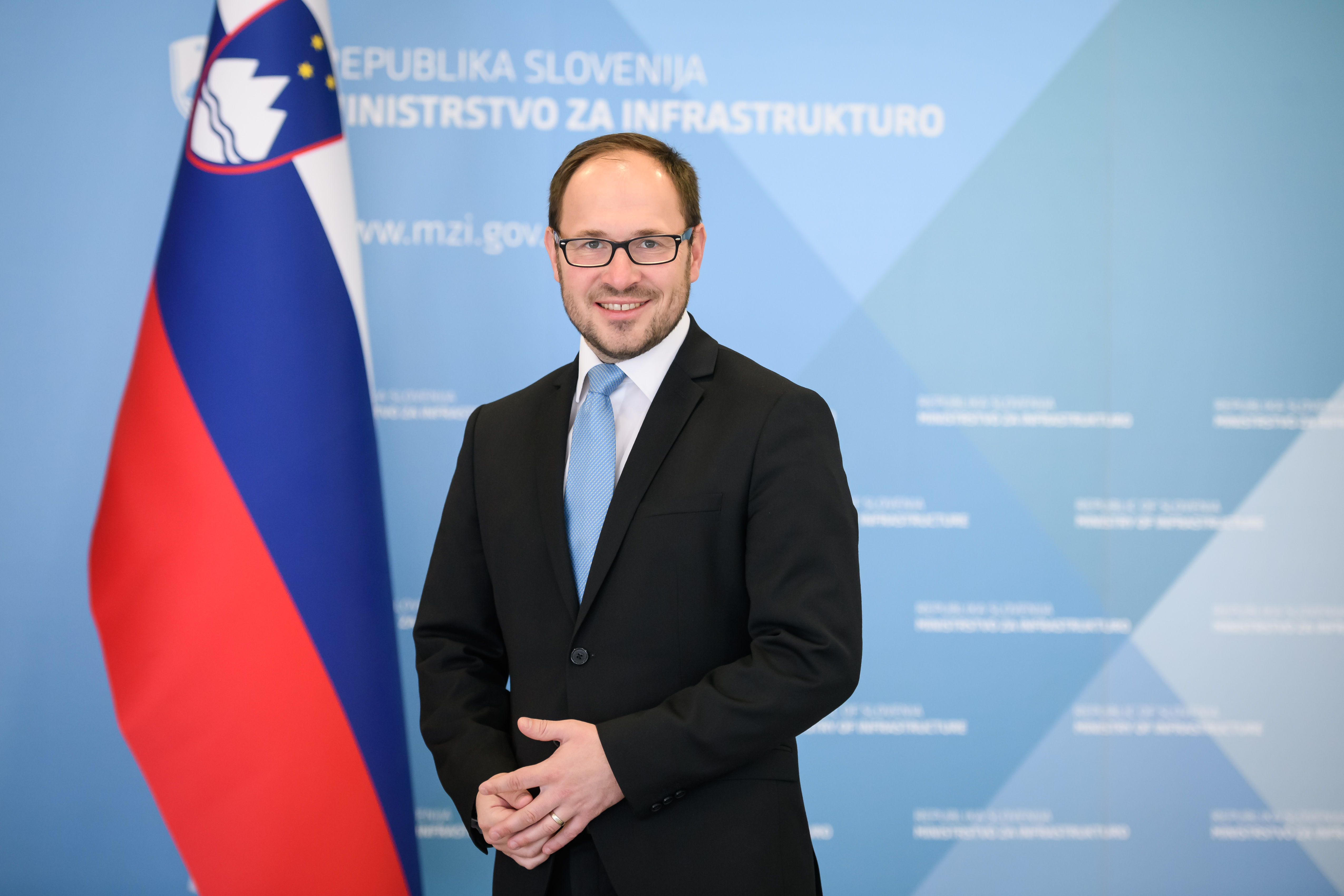ESTABLISHMENT AND DEVELOPMENT
Nova Slovenija (NSi, New Slovenia) was established on 4 August 2000, only months after Slovenska ljudska stranka (SLS, Slovenian People’s Party) and Slovenski krščanski demokrati (SKD, Slovenian Christian Democrats) had merged. Due to the merger the government coalition of the time fell apart and the united SLS+SKD together with Slovenska demokratska stranka(SDS, Slovenian Democratic Party) managed to form a new coalition. The more powerful of the two parties, i. e. the united SKD+SLS, nominated Andrej Bajuk as Prime Minister.
The entire government cabinet was confirmed by the National Assembly on June 7 2000, with Lojze Peterle as Minister of Foreign Affairs. Although the government worked for only five months, it successfully met both internal and external challenges, accelerated harmonization of the Slovenian legislation with the EU legislation, reduced a significant part of the delay in denationalization, proposed some of the reforms that had been only discussed in the preceding 8 years and prepared strategies and national programs.
— READ MORE —
One month after the new government had been appointed, the parliamentary group of the united SLS+SKD, contrary to the agreement, voted for a constitutional act on electoral system and thus bypassed citizens’ will expressed in a referendum. As a sign of protest, Andrej Bajuk and Lojze Peterle resigned from the merged party and established a new party, Nova Slovenija – Krščanska ljudska stranka(New Slovenia – Christian People’s Party), on 4 August 2000 in Ljubljana that aimed to unite all those who identify with Christian, Slovenian and European cultural, democratic, moral and social values. Andrej Bajuk became the first President of Nova Slovenija.The newly established party experienced rapid growth and began setting up a broad local network with many notable members and mayors of former SKD joining in.
Soon after, the electoral campaign started ahead of 2000 National Assembly election. The party concluded it with a grand electoral conference in front of a large audience that filled the Križanke open-air theatre in Ljubljana. At the conference, Andrej Bajuk said that the new political party was founded due to the dissatisfaction with the circumstances of the time, marked by “political rhetoric and conduct that speak one thing while doing the other. Only a party that trusts people can in turn be trusted by the people. It is only such a political party that stays true to its words”. In line with this, the electoral slogan of Nova Slovenijawas: “Word is to be kept.”
In October, only two months after it had been established, Nova Slovenijamade an independent appearance at the general election and gathered 8.66 per cent of votes cast, winning eight seats in the National Assembly of the Republic of Slovenia. Its Members of the National Assembly were: Andrej Bajuk, Jožef Bernik, Janez Drobnič, Ivan Mamić, Lojze Peterle, Alojz Sok, Marija Ana Tisovic and Majda Zupan. After Lojze Peterle was elected to the European Parliament, Matjaž Hafner replaced him as Member of the National Assembly. In the term of 2000-2004, Nova Slovenijawas part of the opposition to the government led by Liberalna demokracija Slovenije(LDS, Liberal Democracy of Slovenia).
In this year, first associations of the party were established: the Mayors’ and Municipal Councillors’ Club, the youth organization of Nova Slovenijacalled Mlada Slovenija(Young Slovenia) and the Women’s Union. November brought the first regular party conference in Rogaška Slatina with the motto “For Europe on Slovenian Soil”, where the fundamental guidelines for the political activities of Nova Slovenijawere set down. The party emphasized the values of dignity, freedom, responsibility and solidarity, and draw attention to the unfinished and encumbered process of Slovenia’s transition. Andrej Bajuk was re-elected as President of the party.— READ MORE —
Nova Slovenijaorganised its first party camp in Selce near Železniki. At the end of 2003, the European Voice proclaimed Lojze Peterle as the European of the Year 2003 in the category achievement of the year. Lojze Peterle earned this title as the Member of Presidium of the Conference on the Future of Europe that prepared institutional reform of the European Union.— READ MORE —
This year was a turning point for Slovenia as the country achieved two goals of foreign policy by joining the NATO and the European Union and Nova Slovenijabecame a full member of the European People’s Party. In June, first election to the European Parliament took place. Nova Slovenijacame up with an innovative campaign, featuring the European bus that carried it throughout Slovenia – from heart to heart. The culmination of the campaign was the European camp of Nova Slovenijain Trebnje, followed by a landslide victory at the European election. The party achieved 23.6 per cent of the votes cast, securing it two MEPs, Lojze Peterle and Ljudmila Novak.
— READ MORE —
In the summer, NSi Seniors’ Association was established and in September, the party was gearing up for the second election to the National Assembly. An innovative campaign tour throughout Slovenia, in which the NSi stressed its commitment to the family-friendly environment and a new family policy, ended with a convention in the full open-air theatre of Križanke in Ljubljana, heralding the victory of the “Spring Parties” (Slovenian centre-right parties) at the upcoming election.
The NSi won 9.09 per cent of votes, earning it nine seats in the National Assembly of the Republic of Slovenia. NSi’s Members of Parliament were Andrej Bajuk, Alojz Sok, Marjetka Uhan, Martin Mikolič, Drago Koren, Anton Kokalj, Jožef Horvat and Mojca Kucler Dolinar. The NSi entered in a centre-right coalition and took over four demanding and responsible ministries: Andrej Bajuk became Minister of Finance, Janez Drobnič led Ministry of Labour, Family and Social Affairs, Lovro Šturm headed Ministry of Justice and Jure Zupan was appointed Minister of Higher Education, Science and Technology, and was later followed by Mojca Kucler Dolinar. Instead of the Ministers, Ciril Testen, Franc Capuder and Majda Zupan became Members of Parliament.
At the beginning of the year, the Worker’s Union of Nova Slovenijawas founded and the party organized the second regular conference in Nova Gorica, featuring the slogan “Offering New Possibilities to Slovenia”. Andrej Bajuk was re-elected as party President and beside passing fifteen resolutions, the congress amended the party statute and program highlighting party’s orientation to the political centre with the broadness of a people’s party and a clear Christian-democratic profile. At the end of the year, Andrej Bajuk received The Banker’s prestigious European award Finance Minister of the Year.— READ MORE —
The congress of the European People’s Party took place in Rome, where Lojze Peterle was elected as its vice-president. At the 2006 local elections, Nova Slovenijawon 6.33 per cent of votes cast, corresponding to 190 seats in municipal councils, and saw 11 of its candidates elected as mayors.— READ MORE —
We will remember this year for the key role of Andrej Bajuk who, as Minister of Finance, made it possible for Slovenia to introduce the euro on January 1, 2007. These efforts brought him the European of the Year award in the category Achievement of the Year presented by the newspaper European Voice.
Slovenia successfully held the presidency of the Council of the European Union. At the National Assembly election in the autumn,Nova Slovenija, despite its constructive role in the government, achieved only 3.4 per cent of votes, thus failing to reach the parliamentary threshold. Immediately after the results had been announced, Andrej Bajuk resigned from the position of party president and the executive committee of Nova Slovenijaappointed Vice-President Ljudmila Novak as Acting President until the irregular electoral party conference would be held. The irregular electoral conference elected Ljudmila Novak as new President of Nova Slovenija. An era of constructing party’s new foundations began, but despite its defeat, the party decided to continue its work and to undertake an almost impossible mission of a return to the National Assembly.
— READ MORE —
The year was marked by hard work and the election to the European Parliament. Nova Slovenija’s European Bus once again visited many Slovenian places and the electoral campaign culminated in the party camp in Lukovica. Hard work of both the party and its candidates resulted in 16.58 % of votes, securing it the third place in the election to the European Parliament. Nova Slovenija’s voice in the European Parliament was represented by the MEP Lojze Peterle.
— READ MORE —
In the summer, the party organised its first summer camp at the Kolpa river intended for socializing and debating. In November, the 3rd regular party conference was held in Maribor where a new basic programme of the party and a new statute were adopted. Nova Slovenija stressed responsible politics close to people and committed to work for people while holding onto the Christian values. The party also decided to change its organizational structure.
Due to a crisis of values that are indispensable in order for an individual and a nation to exist and develop, Slovenia faced a financial, economic, political, moral and family crisis; therefore, Nova Slovenija decided to establish the Values Council. All over Slovenia, it organized discussions on values and the question what kind of country we wish to have, that were well accepted
— READ MORE —
The NSi members met at the party camp in Rogatec which was a prelude to the local elections in the autumn. The NSi received 5.93 % of votes with 10 mayors and 201 municipal councillors elected. Ljudmila Novak was re-elected President by a vast majority at the 4th regular party conference in December in Kranj.
This year was a turning point for the party. In the spring of that year, Nova Slovenijaas a non-parliamentary party managed to collect required 5000 citizens’ signatures to officially submit a legislative proposal on voluntary membership in the Chamber of Agriculture and Forestry of Slovenia. The Economic Club of the NSi was established and its main task was to prepare the economic policy program of the party.
— READ MORE —
In the autumn, the long-awaited decision of the Constitutional Court banned the name of Tito Road in Ljubljana. This was a great success for the party and its youth wing that organized filing of a constitutional review initiative.
The political crisis in Slovenia intensified after the government had not received support for its proposals in four referendums. At the party camp in Loška dolina, President Ljudmila Novak optimistically announced that the party was ready for the election and would return to the parliament.
On August 16, the party was shocked by the news of a sudden death of its founder and first president, Andrej Bajuk. At that moment, the Slovenian politics unified in the thought that a person passed away who strongly marked the progress of a democratic, independent Slovenia and left an important mark, both at home and abroad. Slovenia therefore owes him a lot and, in our memories, he remains as someone who gave much to the country but received very little in return.
In October, the party lost another co-founder and former Member of Parliament, Jože Bernik.
In November, the 5th party conference took place in Ribnica, where President Ljudmila Novak announced the return of Nova Slovenija to the parliament. This was followed by a special campaign “NSi Returns to Parliament” and the actual election campaign “Let’s Return Hope to Slovenia”. Their success was reflected in the rise of NSi support as expressed by public opinion polls. A somewhat provocative advertisement, hard work and belief in success paid off and brought a historic day for both the party and Slovenia. On December 4, 2011, in the early election, Nova Slovenija, as the first party in the history of the independent Slovenia, managed to return to the National Assembly. With a result of 4.88 % of votes, Ljudmila Novak, Matej Tonin, Jožef Horvat and Iva Dimic were elected Members of Parliament. At its constituent session of December 21, 2011, the National Assembly elected NSi President Ljudmila Novak as Vice-President of the National Assembly.
After the party that won the election failed to form its own government coalition, the NSi’s president, Ljudmila Novak, initiated the negotiations among the parties of the centre-right, resulting in the coalition treaty signed by the SDS, the DL (Državljanska lista, Civic List), the SLS, the DeSUS (Demokratična stranka upokojencev, Democratic Party of Pensioners)and the NSi. The government included two members of Nova Slovenija, Ljudmila Novak as Minister for Slovenians Abroad and Aleš Hojs, Minister of Defence. In the National Assembly, Ljudmila Novak was replaced by Janez Vasle.— READ MORE —
In December, the 6th regular party conference took place in Vipava. Ljudmila Novak was re-elected for her third term as President with an overwhelming support.
Political atmosphere of the early 2013 contributed to the fall of the tenth Slovenian Government. Nova Slovenijadecided not to take part in forming a new coalition and retreated into opposition, assuming a constructive attitude nevertheless.
— READ MORE —
In her speech at the party camp in Kamnik, President Ljudmila Novak stressed the values that the party stands for. Soon after, the NSi established its own expert council or the so-called shadow government and began to prepare for the upcoming election.
The NSi conference in Vransko was marked by a partial change of the party name to Nova Slovenija – Krščanski demokrati (New Slovenia – Christian Democrats) and a message that Christian democracy plays an important role in Slovenia and especially in Europe.
In 2014, voters went to the polls three times. At the election to the European Parliament, Nova Slovenijaappeared with the joint list together with the SLS with Lojze Peterle as the lead candidate. Voters rewarded the joint list of two related parties with 16.6 per cent of votes which was the second best result and secured two MEP seats. Thus, Lojze Peterle from the NSi represented Slovenian interests in Brussels and Strasbourg.
— READ MORE —
Due to the frictions among the coalition parties the 11th Slovenian government collapsed and that was followed by an early election in the middle of the year. In the campaign, the NSi advocated its new and modern economic programme that experts assessed was the best way out of crisis. Thanks to this, the party received 5.59 % support and the four former Members of Parliament – Ljudmila Novak, Iva Dimic, Jožef Horvat and Matej Tonin – were joined by Jernej Vrtovec.
Despite an invitation of the winning party to form a coalition, the NSi decided not to join the government but to remain in the opposition. Its reform proposals in the areas of economy, health and justice that the party advocated during the electoral campaign and insisted on them in the negotiations, were not accepted by the potential coalition partners.
At the October local elections, the NSi achieved 6.61 % of votes, improving the results from 2006 and 2010. 10 mayors and 228 municipal councillors were elected.
In the fall of 2017, the NSi party conference was held in Slovenska Bistrica, and it was strongly linked to the candidacy of Ljudmila Novak for the office of President of Republic of Slovenia. In the November election, Ljudmila Novak earned fourth place among nine candidates (7.24 % of the vote).— READ MORE —
At the end of January 2018, the NSi President Ljudmila Novak stepped down and with the support of the NSi Council the NSi Parliamentary Group Leader, Matej Tonin took over interim presidency. On 21 April 2018, at the 12thNSi party conference the delegates elected the new leadership and members of party’s main bodies. The new NSi President became Matej Tonin with just over 92% support.
— READ MORE —
On June 3, 2018, early parliamentary election took place. The electoral campaign was marked by the slogan “NSi Takes It Seriously” and on the election day the party received 7.16 % support or 63.792 votes. Seven candidates from the NSi list were elected to the National Assembly: Iva Dimic, Jožef Horvat, Ljudmila Novak, Blaž Pavlin, Aleksander Reberšek, Matej Tonin and Jernej Vrtovec.
In March, the party celebrated 30 years of Christian Democracy in Slovenia, oriented towards the future, by organizing an event in Bled. The keynote speakers were Lojze Peterle, Prime Minister of the first, independence government, and President of Nova Slovenija, Matej Tonin. The lead candidate of the European People’s Party for the President of the European Commission, Manfred Weber, also attended the event.
— READ MORE —
Sveta Trojica v Slovenskih goricah hosted a traditional party camp that saw presentations of the NSi candidates at the upcoming European Parliament election. In the election, the NSi received 11.06 % of all votes and the lead candidate Ljudmila Novak was elected Member of European Parliament.
At a programme conference in September, the NSi outlined its digitization plan for Slovenia entitled #SmartSlovenia and called for a new national consensus. The debate on digitization was supported by the President of the Republic of Slovenia, Borut Pahor, who promised to hold a consultation on this topic.
The 13th party conference in Maribor took place under the slogan “The Centre” and adopted the new version of the NSi basic programme. The draft programme had been introduced by party’s leaders at regional programme conferences around Slovenia and opened up for public discussion. The revised programme is oriented towards the future, while being aware of the past and having a human at its very centre.
On 13 March 2020, the 14th Government of the Republic of Slovenia, formed by PM Janez Janša after the resignation of former PM Marjan Šarc, was sworn in. In addition to NSi, SDS, SMC and DESUS also joined the government coalition. In the government, the Christian Democrats have taken responsibility for three ministries.— READ MORE —
The NSi ‘s Ministers are: President mag. Matej Tonin is Deputy Prime Minister and Minister of Defence, MP Jernej Vrtovec is Minister of Infrastructure, and Janez Cigler Kralj, President of the NSi Workers’ Association, took over the leadership of the Ministry of Labour, Family, Social Affairs and Equal Opportunities. In the National Assembly Deputies Mr Tonin and Mr Vrtovec were replaced by Mihael Prevc and Andrej Černigoj.
In September, the party celebrated its 20th anniversary (est. in August 2000) with a gala event, where the honorary speaker was the President of the European People’s Party, Donald Tusk.
Due to restrictions against Coronavirus epidemic the Party Congress in November was held in digital form, whereas the elections were conducted by mail. Matej Tonin received strong support (95,7 percent of votes cast) and was elected president of the party for his second term. Further, the delegates elected 6 members of the Executive Board, 5 members of the Supervisory Board and 5 members of the Tribunal.


